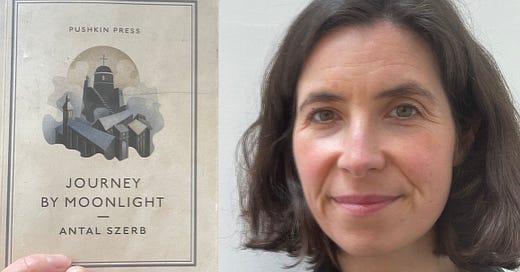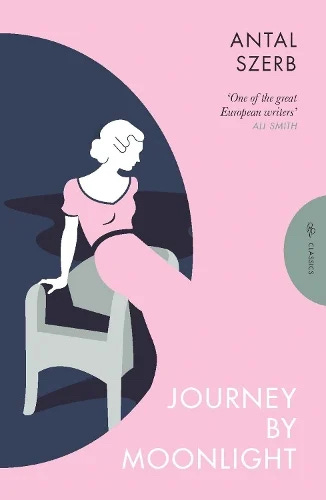📚 🚶Introducing Our July Book
Discover the Hungarian classic Journey by Moonlight by Antal Szerb, translated by Len Rix
Dear walking book clubbers,
As you can see from the pic, my copy of this beloved classic Hungarian novel is rather well-thumbed - it’s the second time I’ve read it, and in the interim it was thoroughly enjoyed by my husband. Here’s the opening line:
“On the train everything seemed fine. The trouble began in Venice, with the back-alleys.”
Intrigued? Find my introduction to and questions about the book below, along with links for further reading and details for all our July events. Watch this space for our Autumn programme, to be announced soon…
A Bonus Emily’s Walking Book Club THIS FRIDAY!
In case you’re free THIS FRIDAY at 4.30-6pm, please do come and join me at the wonderful Idler Festival for an All Passion Spent walking book club. As you probably know, this classic by Vita Sackville-West is one of my all-time favourites. We’ll be setting off from Hampstead’s Fenton House and traversing a different part of the Heath. You can book Friday tickets HERE.
Our July Journey by Moonlight events
Please note that for the benefit of your fellow walkers, you need to have read the book before coming along to a walking book club. If you’ve not read the book, you are very welcome to join the Zoom instead.
Emily’s Regent’s Park Walking Book Club: Friday 19th July, 12-1.45pm, setting off from Daunt Books, 84 Marylebone High Street, W1U 4QW, £8-15
Emily’s Hampstead Heath Walking Book Club: Sunday 21st July, 11.30-1pm, setting off from Daunt Books Hampstead, 51 South End Road, NW3 2QB, £8-15
Emily’s Zoom Book Club: Monday 22nd July, 8-9pm, £1-15
Buy Journey by Moonlight from Daunt Books HERE and receive 10% off using the code WBC at checkout, or just tell them you’re in the group if you’re buying it in the shop.
Introduction & Discussion Points
Antal Szerb was born in 1901 in Budapest into a Jewish family that had converted to Catholicism. He appears to be one of the brainiest people ever to have lived: a formidable scholar, fluent in all the major European languages, and became a prolific essayist and reviewer. He wrote various histories of literature, translations, short stories and novels before, as a result of Hungary’s anti-Semitic laws, he was sent to Balf labour camp and beaten to death aged 43.
In Journey by Moonlight (first published in 1937, translated into English in 2000 by Len Rix), Mihály manages to lose his wife while still on their honeymoon. Then he embarks on a picaresque journey through Italy involving wild night-time wanderings, a stay in a hospital, a visit to a monastery, an affair with an American and more, as he attempts to escape his middle-class life and reconnect to an intense friendship of his adolescence.
Other than Szerb, the only other Hungarian I’ve come across is walking book clubber Mari (see her wonderful Budapest patisserie walk HERE), but based on my sample of two, I wholeheartedly agree with Nicholas Lezard’s assertion in his excellent Guardian piece about the book (see below) that, “a cultivated Hungarian is about as cultivated as you can get”. I’m so grateful to Mari for inspiring me to pick up this book again and also for sending me her notes on it, which have helped inform these following discussion points and questions about the book.
Suicide
A trigger warning here: please note that suicide features heavily in the book. Introduced early on, when Mihály recalls his teenage friend Tamás persuading him to commit suicide with him, comparing it to getting drunk and reflecting: “dying is so much more easy and natural than staying alive…” (His new wife, Erzsi impatiently interrupts at this point: “Do get on with the story.”!) This suicide attempt of Mihály’s fails, but I wonder if we can think about suicide more metaphorically as a process that is occurring in the novel? Is Mihály attempting to kill part of himself as he journeys through Italy? Does he succeed? Is some form of metaphorical suicide necessary for any personal reinvention?
Psychoanalysis
This book is fertile ground for a psychoanalytical reading. I’m no expert, but when Mihály tells Erzsi this story about his formative friendship with Tamas and his sister Eva, prompting him to flee his honeymoon, is he in some kind of Regression? Then, Mihály is very much acting out Freud’s theory about Eros and Thanatos - the Life and Death drives, entwined in an ongoing tussle. Even if we lose the Freudian terminology, what do you think about how Mihály’s physical journey could reflect his inward journey? Are there any key moments of self-realisation? I’m reminded of our April discussion about Out Stealing Horses by Per Petterson, in which similarly a chance encounter in later life with a childhood friend prompts psychological collapse.
Otherness
Whereas the main character, David, from our June book Giovanni’s Room, was ashamed of his otherness and sought to hide it, Mihály desires to be more unconventional. In his obsession with Eva and Tamas, he shunned his petit-bourgeois upbringing. It’s interesting reading about such a yearning for otherness, having just spent some time with the opposite. What do you make of this contrast? How has it affected your own feelings about being (or not being) other?
Night and Moonlight
Like Giovanni’s Room, much of Journey by Moonlight takes place at night, in darkness. (See above point about psychoanalysis!) What do you make of this? I was interested to note, thanks to Mari, that the title in Hungarian is Utas és Holdvilág, which translates literally as “Traveller and Moonlight”. Do you have any thoughts on the differences between the titles? This book has really made me notice the ‘moon’ in honeymoon! Perhaps if we consider moonlight, we can think about how it is always changing as the moon waxes and wanes, and - taken symbolically - could this reflect on the Eros and Thanatos theme and also about life more generally: there are moments of utter darkness and other times of light - times to conform and other times to rebel. What do you think? There’s so much in this book - I can’t wait for our discussions.
Read more…
Start with Nicholas Lezard’s wonderfully enthusiastic piece about Journey by Moonlight in the Guardian, HERE. Then go on to THIS insightful piece by Becca Rothfeld in The New Republic.
THIS short piece by Jennifer Sarha for the European Literature Network is good on Antal Szerb’s (pictured above) work more generally and why we should read him.
If you want to get really into the weeds, and have an hour to spare, then I highly recommend THIS video presentation about Journey by Moonlight and some of the key ideas that interested Szerb by Lukasz Woiñski for the Wirth Institute.
Finally, do check out Szerb’s other works HERE, beautifully published by Pushkin Press, a fantastic publisher, who have brought Stefan Zweig (author of our picks, The Post Office Girl and Beware of Pity) to a wider audience, alongside producing other great books, both new and old, including previous walking book club picks Red Love by Maxim Leo, and The Spectre of Alexander Wolf by Gaito Gazdanov.
Look out next week for my webcast on Journey by Moonlight.
In the meantime, happy reading,
Emily







